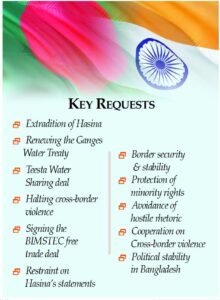Yunus, Modi meeting marks effort to rebuilding trust

Diplomatic Correspondent :
Professor Muhammad Yunus, the Chief Adviser of Bangladesh’s interim government and Indian Prime Minister Narendra Modi met for 40 minutes on Friday on the sidelines of the BIMSTEC Summit in Bangkok.
The two leaders held an in-depth discussion on multiple bilateral issues central to the Bangladesh-India relationship.
This marked their first official meeting since the fall of the Hasina government August last year.
During the meeting, Prof. Yunus raised several key matters of national interest, including the extradition of former Prime Minister Sheikh Hasina, her recent incendiary comments made in India, the recurring incidents of border killings, and the urgent need to renew both the Ganges Water Sharing Treaty and the long-pending Teesta Water Treaty, Chief Advisers Press Secretary Shafiqul Alam told the media after the meeting.

He said, “Both leaders have has discussed all issues related to mutual interests. The meeting was constructive, productive and fruitful.”
On the other hand, according to a press release by India’s Ministry of External Affairs, Prime Minister Modi reiterated India’s continued support for a democratic, stable, peaceful, and inclusive Bangladesh.
India Prime Minister expressed his conviction that all issues of mutual interest between the two countries would continue to be addressed and resolved bilaterally through constructive discussions, in the interest of their long standing and mutually beneficial bilateral relationship.
Enunciating India’s people-centric approach to the relationship, Modi highlighted that cooperation between the two countries has brought tangible benefits to the people of both countries.
He underlined India’s desire to forge a positive and constructive relationship with Bangladesh based on pragmatism.
Prime Minister urged that rhetoric that vitiates the environment is best avoided.
On the border, strict enforcement of the law and prevention of illegal border crossings, especially at night, are necessary for maintaining border security and stability.
Bilateral mechanism could meet as appropriate to review and take forward our ties.
Prime Minister underlined India’s concerns related to the safety and security of minorities in Bangladesh, including Hindus, and expressed his expectation that the Government of Bangladesh would ensure their security, including by thoroughly investigating the cases of atrocities committed against them.
Prime Minister congratulated Bangladesh on assuming the Chair of BIMSTEC and looked forward to the forum further advancing regional cooperation under its leadership.
The leaders agreed to enhance consultations and cooperation to advance regional integration, including under the BIMSTEC framework.
Regarding the extradition of Sheikh Hasina, India’s news agency ANI reported that in response to a question from journalists at the post-meeting press briefing, Foreign Secretary Vikram Misri said, “The extradition of Sheikh Hasina was discussed. Nothing more can be said on this matter.”
Foreign Ministry of Bangladesh stated that the Indian Prime Minister assured that India would continue to engage constructively with Bangladesh to resolve these issues through discussions bilaterally.
The issues of alleged rise of ‘extremism’, ‘and ‘persecution of minority’ also came up in the discussions.
The Chief Adviser urged the Indian side for reality check against the social media propaganda.
He reaffirmed the Interim Government’s strong commitment to ensure safety of all citizens regardless of majority or minority status, Foreign Ministry said.
The Chief Adviser referenced a recent OHCHR Fact-Finding Report detailing grave human rights violations in Bangladesh, which estimated 1,400 protest-related deaths over a short period.
He accused Hasina of inciting violence and directing security forces to harm protesters, raising further concerns about governance under her regime.
Modi attributed some tensions around Hasina’s remarks to social media inflating issues and reiterated India’s commitment to a peaceful and progressive Bangladesh.
The leaders also discussed cross-border violence, with Yunus emphasising the need to reduce fatalities, which harm families and undermine trust. He requested cooperation to prevent such incidents, while Modi clarified that Indian border troops only act in self-defence.
Expressing optimism about Bangladesh’s BIMSTEC chairmanship, Yunus conveyed his vision for enhancing the organisation’s effectiveness in regional trade and cooperation.
He suggested that India send reporters to Bangladesh to investigate claims of violence against minorities, asserting that reports of such attacks had been exaggerated.
During the meeting, Chief Adviser Muhammad Yunus gifted a photograph to Indian Prime Minister Narendra Modi.
The photo showed Modi awarding Yunus a gold medal at the 102nd Indian Science Congress in Mumbai University on January 3, 2015.
According to Deputy Press Secretary Abul Kalam Azad Majumder, the gesture was meant to show goodwill. Despite tensions, both leaders shared smiles during a brief photo-op.
After the fall of Sheikh Hasina in a mass upsurge, Yunus now heads the Interim Government. Since then the relation between Bangladesh and India began to freeze as Awami League government was much favoured to India.
Following the political shift and strain relations, the bilateral trade reportedly has fallen by 18 percent.
In addition, the reduction of issuing Indian visas for Bangladeshi citizens has drastically affected the bilateral relations as patients and students could not visit for medical treatment and visa purposes for third countries.
These steps taken by the India government has hit back their own vibrant business in Kolkata as media reported.
